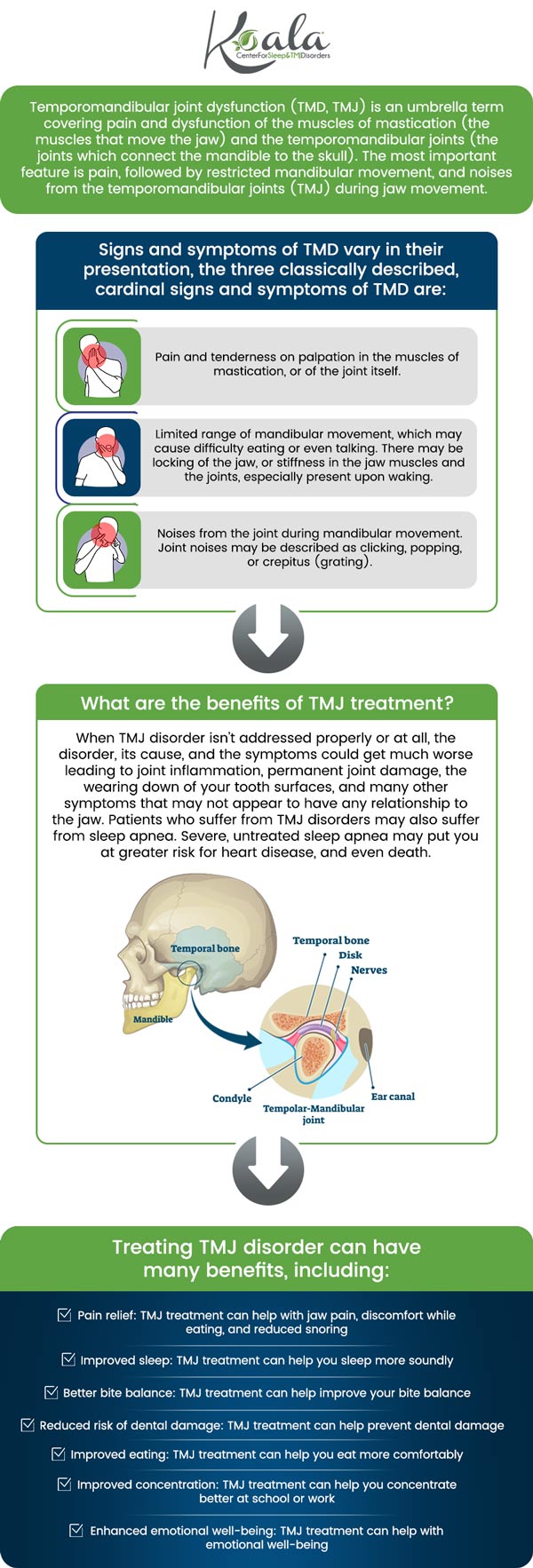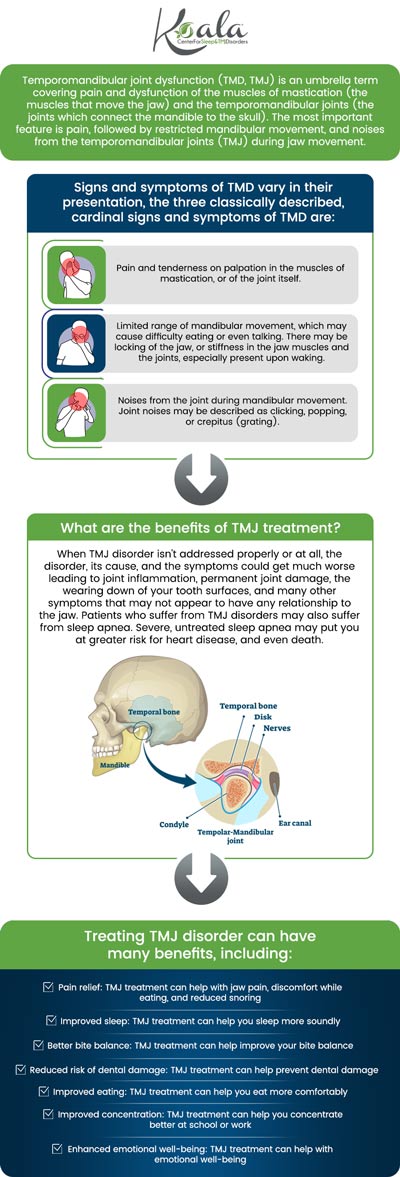What Are the Benefits of Seeing a TMJ Specialist for Jaw Pain?
A TMJ specialist focuses on diagnosing and treating disorders related to the temporomandibular joint, which can cause jaw pain, headaches, and difficulty chewing. At Koala Center For Sleep & TMJ Disorders, our specialists provide personalized care to help alleviate your TMJ symptoms and improve your quality of life. For more information, please contact us today or request an appointment online. We have convenient locations in Bloomington IL, Peoria/Dunlap IL, El Paso TX, and Wausau WI.


Table of Contents:
What treatments can a TMJ specialist provide?
How do I know if I need to see a TMJ specialist?
What are the benefits of seeing a TMJ specialist for jaw pain?
How long does it take to see results from treatment with a TMJ specialist?
A TMJ specialist focuses on disorders involving the temporomandibular joint, which connects the jaw to the skull and plays a role in talking, chewing, and general jaw movement. When this joint becomes misaligned or inflamed, it can trigger a range of symptoms from jaw stiffness and clicking to chronic pain in the neck, face, or even shoulders. The treatment plan typically begins with a detailed evaluation to identify the source of the dysfunction. From there, specialists might recommend custom orthotics designed to realign the bite, reduce joint strain, and improve jaw mechanics. In many cases, these are noninvasive, removable devices that are worn during specific periods of the day or night. Dietary and behavioral modifications may also be introduced to help reduce flare-ups and improve day-to-day comfort. The specialists at Koala Center For Sleep & TMJ Disorders create individualized plans tailored to the patient’s symptoms, medical history, and lifestyle so the approach addresses the unique demands of their condition. The overall goal is to restore normal joint function, relieve discomfort, and help prevent long-term damage to the jaw or surrounding structures.
Recurring headaches, facial tension, earaches without infection, or a jaw that clicks or locks can all be signs that the temporomandibular joint is not functioning properly. Pain while chewing, difficulty opening the mouth fully, or a shifting bite are other common warning signs. In some cases, the discomfort is subtle but persistent, presenting alongside a dull ache in the jaw or temples that comes and goes throughout the day. If standard dental exams or primary care visits haven’t revealed a clear cause, that’s often a sign a more focused assessment is needed.
Sleep disturbances can also point to an underlying TMJ disorder, especially when teeth grinding or jaw clenching is present. These unconscious habits can place a tremendous amount of pressure on the joint, wearing it down over time. When symptoms are ignored, they tend to become more disruptive and may impact basic functions like eating and speaking or leading to more widespread tension throughout the face, neck, and shoulders. A visit to a TMJ specialist can help pinpoint what’s happening beneath the surface and start the process of correcting the problem before it progresses any further.
Jaw pain can sometimes seem like a minor inconvenience, but when left unaddressed it can worsen and adversely impact overall quality of life. Seeing a TMJ specialist allows the source of that discomfort to be identified and addressed at the root. The benefit of this targeted care is that treatment plans are tailored specifically to the mechanisms of the jaw joint and its surrounding muscles. The right therapy can restore smoother jaw movement, relieve pressure on the joint, and help prevent further wear and tear. Issues like chronic fatigue from disrupted sleep, tension-related headaches, and even poor posture tied to bite misalignment can all ease up with consistent care. With the proper guidance and ongoing support, patients often find their symptoms diminish and eventually stop interfering with daily life altogether.
The timeline for results can vary from one individual to the next, depending on how long the symptoms have been present and what’s contributing to the joint dysfunction. In some cases, patients feel an improvement in mobility and a reduction in pain within the first few weeks of beginning their treatment, particularly when a well-fitted orthotic or night appliance is introduced. These early changes often lead to less strain on the jaw during daily movement, fewer flare-ups, and more consistent alignment throughout the day.
For others dealing with more advanced symptoms or complex underlying issues, treatment may need to extend over several months to allow the joint to gradually heal and respond to the interventions. Follow-ups are typically scheduled to adjust the approach as needed, whether that means modifying an orthotic, introducing new therapies, or shifting the focus based on how the body is responding. While no two cases are identical, the specialists at Koala Center For Sleep & TMJ Disorders aim for steady, progressive relief working toward long-term improvement and symptom relief. For more information, contact us.

Additional Services You May Need
▸ KoalaKIDZzz®
▸ Sleep Apnea
▸ Snoring
▸ TMJ Disorder
▸ Fatigue
▸ Sleep Disorders
▸ Weight Loss
▸ CPAP Alternative
▸ Oral Appliances




